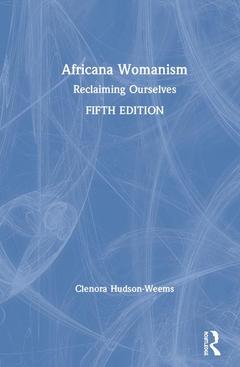Africana Womanism (5th Ed.) Reclaiming Ourselves
Auteur : Hudson (Weems) Clenora

First published in 1993, this is a new edition of the classic text in which Clenora Hudson-Weems sets out a paradigm for women of African descent. Examining the status, struggles and experiences of the Africana woman forced into exile in Europe, Latin America, the United States or at Home in Africa, the theory outlines the experience of Africana women as unique and separate from that of some other women of color, and, of course, from white women. Differentiating itself from the problematic theories of Western feminisms, Africana Womanism allows an establishment of cultural identity and relationship directly to ancestry and land.
This new edition includes five new chapters as well as an evolution of the classic Africana womanist paradigm, to that of Africana-Melanated Womanism. It shows how race, class and gender must be prioritized in the fight against every day racial dominance. Africana Womanism: Reclaiming Ourselves offers a new term and paradigm for women of African descent. A family-centered concept, prioritizing race, class and gender, it offers eighteen features of the Africana womanist (self-namer, self-definer, family-centered, genuine in sisterhood, strong, in concert with male in the liberation struggle, whole, authentic, flexible role player, respected, recognized, spiritual, male compatible, respectful of elders, adaptable, ambitious, mothering, nurturing), applying them to characters in novels by Hurston, Bâ, Marshall, Morrison and McMillan. It evolves from Africana Womanism to Africana-Melanated Womanism.
This is an important work and essential reading for researchers and students in women and gender studies, Africana studies, African-American studies, literary studies and cultural studies, particularly with the emergence of family centrality (community and collective engagement), the very cornerstone of Africana Womanism since its inception.
Foreword from the 1st edition ‘Zulu Sofola; Foreword to the 5th edition James B. Stewart and Ama Mazama; Preface from the 1st edition Clenora Hudson-Weems; Introduction Daphne Williams Ntiri; PART ONE Theory, Chapter I Africana Womanism; Chapter II Cultural and Agenda Conflicts in Academia: Critical Issues for Africana Women’s Studies; Chapter III Africana Womanism: A Theoretical Need and Practical Usefulness; Chapter IV The Agenda of the Africana Womanist (revised); PART TWO Five Africana Womanist Novels; Chapter V Hurston’s Their Eyes Were Watching God: Seeking Wholeness;Chapter VI Ba’s So Long a Letter: A Family Affair; Chapter VII Marshall’s Praisesong for the Widow: Authentic Existence; Chapter VIII Morrison’s Beloved: All Parts Equal; Chapter IX McMillan’s Disappearing Acts: In It Together; PART THREE From Africana Womanism to Africana-Melanated Womanism; Chapter X Authenticating and Validating Africana-Melenated Womanism: A Global Paradigm for Human Survival; Chapter XI Africana Womanism’s Race, Class and Gender: Pre-Intersectionality; Chapter XII Africana-Melanated Womanism: Forging Our Way via Securing Each Other (2019 Keynote Address—2nd International Africana-Melanated Womanism Conference); Chapter XIII Africana-Melanated Womanism and the King-Parks-Till Connectio; Chapter XIV Conclusion; Afterword Mark Christian; Bibliography; Annotated Africana Womanism Bibliography: a Blueprint; Appendix: Africana-Melanated Womanism Syllabus; Index
Clenora Hudson-Weems coined the concept of Africana Womanism. She has written several books on the concept, in addition to significant works on Emmett Till and Toni Morrison. Recipients of numerous awards, she was distinguished Honoree for the 1st International Africana Womanism Conference at the University of Zimbabwe, 2010.
The first to established Emmett Till as the true catalyst of the Modern Civil Rights Movement in her 1988 Ford Doctoral Dissertation, "Emmett Till: The Impetus of the Modern Civil Rights Movement" (University of Iowa), she has written three books on the subject, including the dissertation-turned-book, Emmett Till: The Sacrificial Lamb of the Civil Rights Movement (1994), and Emmett—Legacy, Redemption & Forgiveness (2014) upon which her film script is based. She is co-author of Toni Morrison (1990), the first book written on the Nobel Laureate.
Date de parution : 10-2019
15.6x23.4 cm
Disponible chez l'éditeur (délai d'approvisionnement : 14 jours).
Prix indicatif 160,25 €
Ajouter au panierDate de parution : 10-2019
15.6x23.4 cm
Disponible chez l'éditeur (délai d'approvisionnement : 14 jours).
Prix indicatif 45,15 €
Ajouter au panierThèmes d’Africana Womanism :
Mots-clés :
Africana Womanism; womanism; Tea Cake; woman; California State University; identity; NAACP Annual Convention; Cultural Studies; Super Woman; Literary Studies; Human Suffering; culture; St Priority; feminism; Ruth Mompati; Exile; African American Literary Tradition; African-American Studies; Black Feminism; Africana Studies; African Feminism; Africa; Dual Gender System; Gender Studies; Nigerian Daily Times; Africana woman struggles; Underground Railroad Conductor; liberation struggle; Black Women Poverty; racial dominance; Ama Mazama; class discrimination; Feeble Minded Girls; Africana-Melanated Womanism; Delaware State University; Triple Plight; Shack Dwellers Federation; Marshall’s Praisesong; Logan Killicks; Black Feminists; NAWSA; Emmett Till



